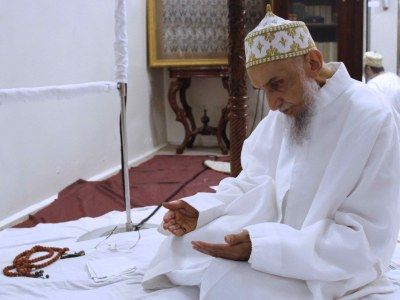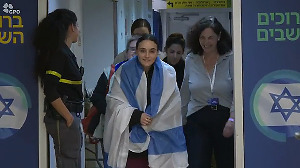 The uncle versus nephew fight for the spiritual leadership of the Dawoodi Bohras enters the court-room, spilling family secrets and exposing the divide in the community. Jyoti Punwani reports.
The uncle versus nephew fight for the spiritual leadership of the Dawoodi Bohras enters the court-room, spilling family secrets and exposing the divide in the community. Jyoti Punwani reports.
Jealousy and intrigue, attacks and assassination attempts -- the closed and highly exclusive world of the powerful ruling priestly family of the Dawoodi Bohras lay exposed on Tuesday in a Mumbai courtroom, reminding one of the intrigues of the Mughal empire.
The Bombay high court’s majestic Central Court where Lokmanya Tilak had argued for Swarajya, formed a fitting backdrop to the story which unfolded during the cross-examination of Khuzaima Qutbuddin, (image, left), the 74-year-old brother of the late Syedna Mohammed Burhanuddin, the 52nd Dai or spiritual head of the Dawood Bohra community. The cross-examination was conducted by Iqbal Chagla.
The Syedna died on January 17, 2014, and his son Mufaddal Saifuddin took over as the next Syedna. Qutbuddin has challenged this ascension, claiming that he himself is entitled to that position.
While he admitted that none of his 12 brothers and eight sisters, all children of the 51st Dai, had acknowledged openly his claim of being the successor to Syedna Mohammed Burhanuddin, Qutbuddin maintained that he had been conferred the nass (ie, officially anointed) by the former on December 10, 1965 -- in secret. He was the only witness to this, he said.
He had not asked the Syedna why this event should be kept a secret, said Qutbuddin; he had simply obeyed the Syedna’s request that it should. But his uncle had asked the Syedna why the nass was not being made public. “Talwaaro chali jaasey” (swords will be unleashed), was the reply given to him, revealed Qutbuddin.
But weapons deadlier than swords figured in Qutbuddin’s testimony.
Referring to attempts at eliminating/assassinating him, Qutbuddin described two incidents without giving a date to either. The first was in Indore during Muharram, the second in Yemen. While in Indore there was an attempt to physically attack him, in Yemen, firing had taken place on a car in which one person had died.
Qutbuddin said he had been expected to travel along with that car, but he had changed his plan at the last minute. “I believe that it had been arranged to block my car and open fire on it. Since I had stayed behind, it was the persons in the second car who were attacked,” he said.
According to Qutbuddin, he had been the object of jealousy from way back in 1961-62, due to the position of respect he held in the community. Yusuf Najmuddin Bhaisaheb, his half-brother, who had been 20 years senior to him, had felt slighted, revealed Qutbuddin, and had actually told the latter he felt jealous of him. Said Qutbuddin: “Najmuddin told me that I had attained such a high position at such a young age that he was very jealous of me.”
From that time on, said Qutbuddin, Najmuddin started scheming against him.
Thereafter, a few years after the late Syedna Mohammed Burhanuddin took over, Najmuddin influenced the Syedna’s family against him as well, including his son Mufaddal Saifuddin (the current Syedna). Saifuddin is Najmuddin’s son-in-law, he pointed out.
 In the ’80s, Mufaddal Saifuddin (seen on the left with Prime Minister Narendra Modi) and his brothers joined Najmuddin in scheming against him, said Qutbuddin. Together, they succeeded to a certain extent in maligning him in the eyes of the community. In fact, some “well-positioned members of the community, prominent businessmen” had personally told Qutbuddin that Najmuddin had poisoned their minds against him.
In the ’80s, Mufaddal Saifuddin (seen on the left with Prime Minister Narendra Modi) and his brothers joined Najmuddin in scheming against him, said Qutbuddin. Together, they succeeded to a certain extent in maligning him in the eyes of the community. In fact, some “well-positioned members of the community, prominent businessmen” had personally told Qutbuddin that Najmuddin had poisoned their minds against him.
Najmuddin passed away in 1987 in Cairo; Qutbuddin did not attend his funeral as he was in Burhanpur then, he said.
Yet, despite the scheming and the secret nass, the respect that he was accorded by many, including his uncle, who was third in the Dawoodi Bohra hierarchy (Qutbuddin was second), made him believe that many persons knew he had been anointed successor.
Qutbuddin said this could have been because of the favours that the late Syedna had showered upon him. Indeed, while appointing him Mazoon (second in the hierarchy after the Dai), the late Syedna had said in his sermon: “You are a beloved son.” “This carried the meaning that I was more than a Mazoon, I was his successor,” said Qutbuddin.
To a question whether he believed the current Syedna Mufaddal Saifuddin too knew that he had been conferred the nass, Qutbuddin replied, “I think so.”
The intense rivalries and intrigues were not the only facet of the priestly family that were laid bare in court. The absolute authority over the community enjoyed by the Syedna and his second-in-command, the Mazoon, were also described in their full glory.
The frail-looking Qutbuddin, who had to be helped into and out of his chair, held forth in firm, ringing tones on the position of Mazoon, which he had held.
“The Dai and the Mazoon together guide the community. They are the fountains of spiritual knowledge of the community, the only two ranks referred to in this manner. Both are the only ones who spread spiritual knowledge. They have the right to decide what spiritual knowledge is to be disseminated and from what text. They are the two who give knowledge to teachers and students seeking higher religious knowledge.”
It was the duty of the Mazoon to protect the Dai, and the veracity of the Mazoon, said Qutbuddin, was “beyond doubt.”
It is rarely that a Syedna or anyone close to him in hierarchy comes to court. When Qutbuddin, who one section of the community believes is the 53rd Dai, and who is the spitting image of his late brother, entered the court, many of his followers kissed his hand. Before he could sit on one of the cushioned chairs, his followers spread a white and green printed quilt on the chair, repeating the same before he took the witness’s chair.
A footstool was provided for him as he deposed. During breaks in the cross-examination, his followers knelt before him, listening to his instructions.
“How shall I address the plaintiff?” Justice Gautam Patel asked Qutbuddin’s legal team, led by advocates Ravi Kadam and Anand Desai. “I don’t want to hurt anyone’s feelings.” “As the plaintiff,” replied Advocate Kadam. Plainly uncomfortable with addressing him as ‘Plaintiff’ or ‘Mr Qutbuddin’, the judge did not use any term to address him.
However, none of this affected the majesty of the law. Finding the plaintiff repeatedly evading a direct reply to a question regarding the names of persons of “higher spiritual learning” in the community, the judge told him: “You’ve come to my court. Be under no misapprehension… The other side is entitled to ask you what you mean. Do you mean yes or no? The witness is directed to answer the question.”
But perhaps the one time the saying ‘Howsoever high may you be, the law is above you’ came to life was when the court clerk, after administering oath to Qutbuddin, and asking him his name, asked, as is the rule: “What’s your occupation?”
The surprise on the face of Khuzaima Qutbuddin, claimant to the position of the supreme head of the Dawoodi Bohra community, and the hushed embarrassed titter that swept the room, will not be forgotten for a long time.
Image credits: Photograph of Khuzaima Qutbuddin courtesy www.fatemidawat.com; photograph of Syedna Mufaddal Saifuddin courtesy Wikipedia.











 © 2025
© 2025